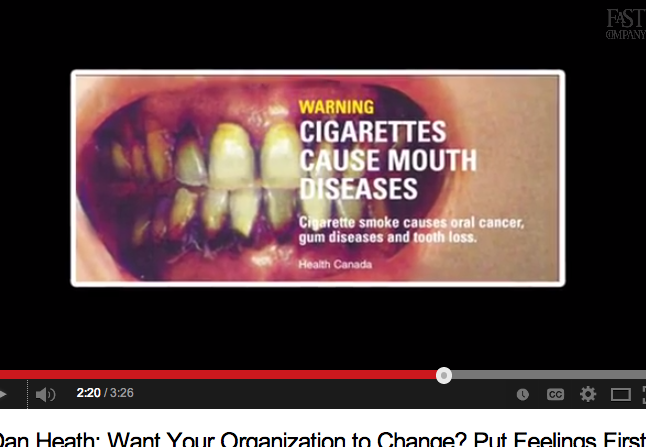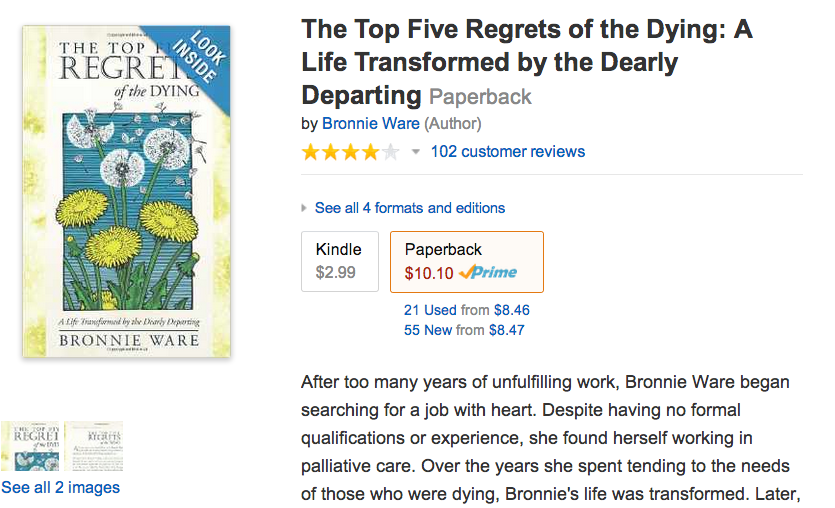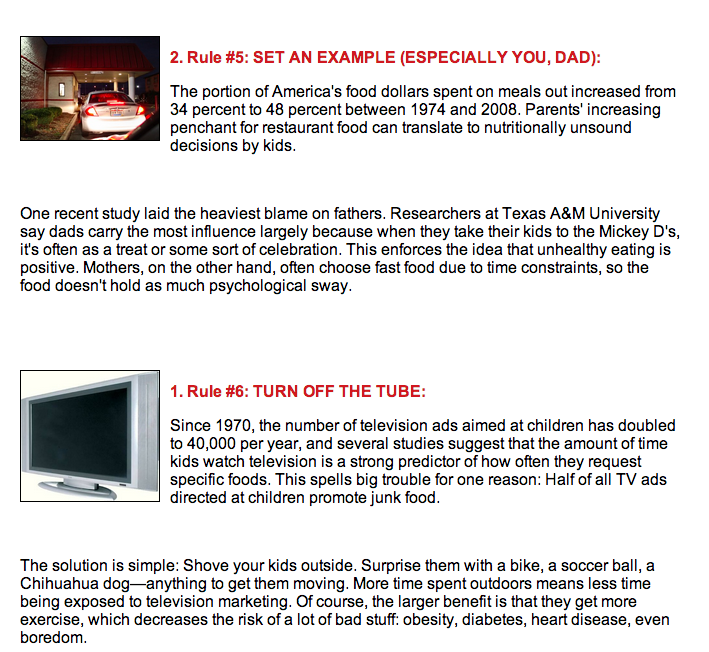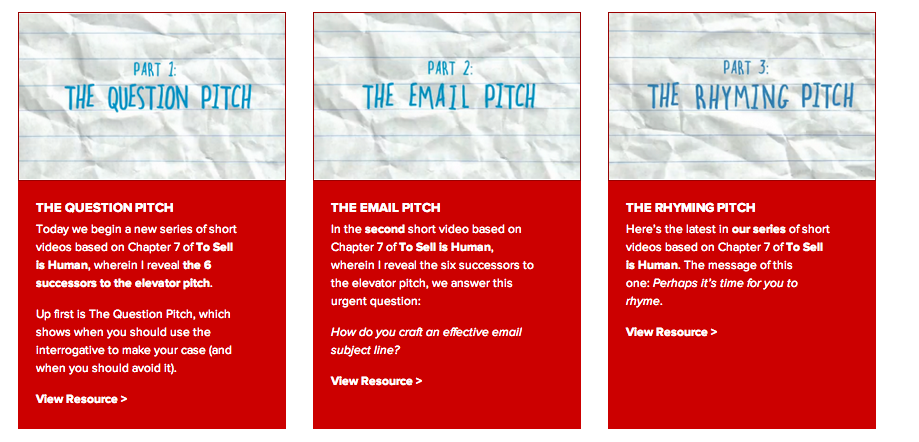There are three Dans who deserve your attention: Dan Pink, Dan Amen and Dan Heath.
These materials come from http://www.fastcompany.com/1635067/dan-heath-want-your-organization-change-put-feelings-first Fast Company
You can even read the transcript of the first video. (ABOVE)
Dan Heath on How to Change when Change is Hard
Presented by Dan Heath

Date:
 Dan Heath is the co-author, along with his brother Chip, of the book Made to Stick: Why Some Ideas Survive and Others Die . Made to Stick is a Business Week and New York Times bestseller, and it has been translated into 23 languages, including Thai, Arabic, and Lithuanian. Amazon readers voted it one of the top 100 books of 2007, and Amazon editors named it the #2 business book of the year. Dan's new book, Switch, is scheduled for release in February 2010. Dan co-authors a monthly column for Fast Company magazine and serves as a Consultant to the Policy Programs at the Aspen Institute. He has taught and consulted with organizations such as Microsoft, Macy's, Nestle, and the American Heart Association. Prior to joining the Aspen Institute, Dan conducted research and wrote case studies for Harvard Business School, and more recently, he worked and taught in the executive education division of Duke University.
other links
Dan Heath is the co-author, along with his brother Chip, of the book Made to Stick: Why Some Ideas Survive and Others Die . Made to Stick is a Business Week and New York Times bestseller, and it has been translated into 23 languages, including Thai, Arabic, and Lithuanian. Amazon readers voted it one of the top 100 books of 2007, and Amazon editors named it the #2 business book of the year. Dan's new book, Switch, is scheduled for release in February 2010. Dan co-authors a monthly column for Fast Company magazine and serves as a Consultant to the Policy Programs at the Aspen Institute. He has taught and consulted with organizations such as Microsoft, Macy's, Nestle, and the American Heart Association. Prior to joining the Aspen Institute, Dan conducted research and wrote case studies for Harvard Business School, and more recently, he worked and taught in the executive education division of Duke University.
other links

Date:
“Your success in life isn't based on your ability to simply change. It is based on your ability to change faster than your competition, customers and business.”
--- Mark Sanborn
Consider change at every level—individual, organizational, and societal. Maybe you want to help your brother beat his email addiction. Maybe you need your team at work to act more frugally because of the times. Maybe you wish more of your neighbors would bike to work. Usually these topics are treated separately—there is “change management” advice for executives and “self-help advice” for individuals and “change the world” advice for activists. That’s a shame, because all change efforts have something in common: For anything to change, someone has to start acting differently. We believe there’s a way to do exactly that, and to see how, we’ve got to explore one of the most fascinating findings of modern psychology. This framework is designed for people who don’t have scads of authority or resources. Whether the switch you seek is in your family, in your charity, in your organization, or in society at large, you’ll get there by making three things happen. Come find out what those things are.
During this program you will learn:
· The three part framework to help you change things in tough times
· How to make those change efforts stick
· How to turn seemingly hard changes into much easier change efforts
 Dan Heath is the co-author, along with his brother Chip, of the book Made to Stick: Why Some Ideas Survive and Others Die . Made to Stick is a Business Week and New York Times bestseller, and it has been translated into 23 languages, including Thai, Arabic, and Lithuanian. Amazon readers voted it one of the top 100 books of 2007, and Amazon editors named it the #2 business book of the year. Dan's new book, Switch, is scheduled for release in February 2010. Dan co-authors a monthly column for Fast Company magazine and serves as a Consultant to the Policy Programs at the Aspen Institute. He has taught and consulted with organizations such as Microsoft, Macy's, Nestle, and the American Heart Association. Prior to joining the Aspen Institute, Dan conducted research and wrote case studies for Harvard Business School, and more recently, he worked and taught in the executive education division of Duke University.
Dan Heath is the co-author, along with his brother Chip, of the book Made to Stick: Why Some Ideas Survive and Others Die . Made to Stick is a Business Week and New York Times bestseller, and it has been translated into 23 languages, including Thai, Arabic, and Lithuanian. Amazon readers voted it one of the top 100 books of 2007, and Amazon editors named it the #2 business book of the year. Dan's new book, Switch, is scheduled for release in February 2010. Dan co-authors a monthly column for Fast Company magazine and serves as a Consultant to the Policy Programs at the Aspen Institute. He has taught and consulted with organizations such as Microsoft, Macy's, Nestle, and the American Heart Association. Prior to joining the Aspen Institute, Dan conducted research and wrote case studies for Harvard Business School, and more recently, he worked and taught in the executive education division of Duke University.
Order this book from Amazon.com
- www.fastcompany.com/section/made-to-
stick Cached
... by Fast Company columnists Dan and Chip Heath. ... We think if my Dad justunderstood the health complications obesity ... Knowledge rarely leads to change. - www.fastcompany.com/person/john-kotter Cached
Fast Company inspires a new breed of innovative ... Dan Heath: Want Your Organization to Change? ... We think if my Dad just understood the health complications ... - www.randomhouse.com/book/77687 Cached
... accomplished educators and idea collectors Chip and Dan Heath tackle head-on these ... We understand it, ... They write a regular column in Fast Company ...
HOMEWORK: How can you use this information in your life?
After hearing these two videos, what has changed in your perception about "how to persuade people to change their behavior?" and "how to change habits in yourself"?
















































